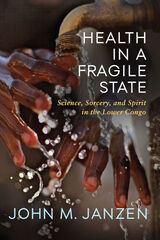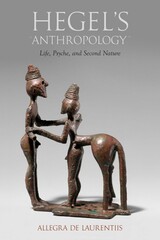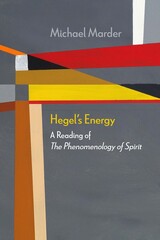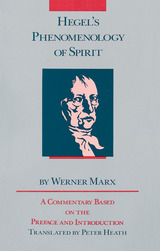102 books about Spirit and 6
start with H
102 books about Spirit and 6
102 books about Spirit
6 start with H start with H
6 start with H start with H

Health in a Fragile State
Science, Sorcery, and Spirit in the Lower Congo
John M. Janzen
University of Wisconsin Press, 2019
Based on extensive field research in the Manianga region of the Lower Congo, Health in a Fragile State is an anthropological account of public health and health care after the collapse of the Congolese state in the 1980s and 1990s. This work brings into focus John M. Janzen's earlier books on African health and healing, revealing the collaborative effort by local, national, and international agencies to create viable alternative institutions to those that represented the centralized state. This book documents and analyzes the realignment of existing institutions and the creation of new ones that shape health and healing.
Janzen explores the manner in which power and information, including science, are legitimized in the preservation and improvement of health. Institutional validity and knowledge empower citizens and health practitioners to gain the upper hand over the region's principal diseases, including malaria, tuberculosis, typhoid, and HIV/AIDS.
Janzen explores the manner in which power and information, including science, are legitimized in the preservation and improvement of health. Institutional validity and knowledge empower citizens and health practitioners to gain the upper hand over the region's principal diseases, including malaria, tuberculosis, typhoid, and HIV/AIDS.
[more]

Hegel’s Anthropology
Life, Psyche, and Second Nature
Allegra de Laurentiis
Northwestern University Press, 2021
This book provides a critical analysis of Hegel’s Anthropology, a long-neglected treatise dedicated to the psyche, or “soul,” that bridges Hegel’s philosophy of organic nature with his philosophy of subjective spirit. Allegra de Laurentiis recuperates this overlooked text, guiding readers through its essential arguments and ideas. She shows how Hegel conceives of the “sublation” of natural motion, first into animal sentience and then into the felt presentiment of selfhood, all the way to the threshold of self-reflexive thinking. She discusses the Anthropology in the context of Hegel’s mature system of philosophy (the Encyclopaedia) while also exposing some of the scientific and philosophical sources of his conceptions of unconscious states, psychosomatism, mental pathologies, skill formation, memorization, bodily habituation, and the self-conditioning capacities of our species. This treatise on the becoming of anthropos, she argues, displays the power and limitations of Hegel’s idealistic “philosophy of the real” in connecting such phenomena as erect posture, a discriminating hand, and the forward gaze to the emergence of the human ego, or the structural disintegration of the social world to the derangement of the individual mind.
A groundbreaking contribution to scholarship on Hegel and nineteenth-century philosophy, this book shows that the Anthropology is essential to understanding Hegel’s concept of spirit, not only in its connection with nature but also in its more sophisticated realizations as objective and absolute spirit. Future scholarship on this subject will recount—and build upon—de Laurentiis’s innovative study.
A groundbreaking contribution to scholarship on Hegel and nineteenth-century philosophy, this book shows that the Anthropology is essential to understanding Hegel’s concept of spirit, not only in its connection with nature but also in its more sophisticated realizations as objective and absolute spirit. Future scholarship on this subject will recount—and build upon—de Laurentiis’s innovative study.
[more]

Hegel's Energy
A Reading of The Phenomenology of Spirit
Michael Marder
Northwestern University Press, 2021
Hegel’s The Phenomenology of Spirit has been one of the most important works of philosophy since the nineteenth century, while the question of energy has been crucial to life in the twenty-first century. In this book, Michael Marder integrates the two, narrating a story about the trials and tribulations of energy embedded in Hegel’s dialectics. Through an original interpretation of actuality (Wirklichkeit) as energy in the Hegelian corpus, the book provides an exciting lens for understanding the dialectical project and the energy‑starved condition of our contemporaneity. To elaborate this theory, Marder undertakes a meticulous rereading of major parts of the Phenomenology, where the energy deficit of mere consciousness gives way to the energy surplus of self‑consciousness and its self‑delimitation in the domain of reason. In so doing, he denounces the current understanding of energy as pure potentiality, linking this mindset to pollution, profit-driven economies, and environmental crises. Surprising and deeply engaged with its contemporary implications, this book doesn’t simply illuminate aspects of The Phenomenology of Spirit—it provides an entirely new understanding of Hegel’s ideas.
[more]

Hegel's Phenomenology of Spirit
A Commentary Based on the Preface and Introduction
Werner Marx
University of Chicago Press, 1988
Hegel's classic Phenomenology of Spirit is considered by many to be the most difficult text in all of philosophical literature. In interpreting the work, scholars have often used the Phenomenology to justify the ideology that has tempered their approach to it, whether existential, ontological, or, particularly, Marxist. Werner Marx deftly avoids this trap of misinterpretation by rendering lucid the objectives that Hegel delineates in the Preface and Introduction and using these to examine the whole of the Phenomenology. Marx considers selected materials from Hegel's text in order both to clarify Hegel's own view of it and to set the stage for an examination of post-Hegelian philosophy.
The primary focus of Marx's book is on the account. Hegel gives of the phenomenological journey from natural consciousness to philosophical wisdom (or absolute knowledge, as Hegel calls it). In showing that Hegel's many statements concerning consciousness 'finding itself' or 'knowing itself' in its world can be understood as discovering the rationality of the conditioning world, Marx offers a solution to several sets of interrelated problems that have troubled students of Hegel. His book contains valuable analyses of the relation between Hegel's thought and that of Descartes and Kant as well as that of Karl Marx, and it also sheds considerable light on the question of the internal unity or coherence of the Phenomenology.
The primary focus of Marx's book is on the account. Hegel gives of the phenomenological journey from natural consciousness to philosophical wisdom (or absolute knowledge, as Hegel calls it). In showing that Hegel's many statements concerning consciousness 'finding itself' or 'knowing itself' in its world can be understood as discovering the rationality of the conditioning world, Marx offers a solution to several sets of interrelated problems that have troubled students of Hegel. His book contains valuable analyses of the relation between Hegel's thought and that of Descartes and Kant as well as that of Karl Marx, and it also sheds considerable light on the question of the internal unity or coherence of the Phenomenology.
[more]

Hegel’s Phenomenology, Part 2
The Evolution of Ethical and Religious Consciousness to the Absolute Standpoint
Howard P. Kainz
Ohio University Press, 1983
The publication in 1807 of Georg Wilhelm Frederich Hegel’s Phanomenologie des Geistes (translated alternately as “Phenomenology of Mind” or “Phenomenology of Spirit”) marked the beginning of the modern era in philosophy. Hegel’s remarkable insights formed the basis for what eventually became the Existentialist movement. Yet the Phenomenology remains one of the most difficult and forbidding works in the canon of philosophical literature.
[more]

Hockey Priest
Father David Bauer and the Spirit of the Canadian Game
Matt Hoven
Catholic University of America Press, 2024
Born in Waterloo, Ontario, in 1924, to a prominent family, David Bauer attended St. Michael’s College-School run by the Basilian Fathers of Toronto. After serving in World War II, Bauer joined the religious community and coached its St. Michael’s Majors to a national championship in 1961. Influenced by philosophers like Jacques Maritain, Bauer tried to find solutions to problems created within elite hockey and thus founded Canada’s first ever National Team program. This team countered the cutthroat ideals of hockey’s powerbrokers and set out to return Canada to international glory. The team represented the nation at several global tournaments and three Winter Olympic Games. Bauer was posthumously inducted into the Hockey Hall of Fame in 1989.
Hockey Priest looks past simply understanding Bauer as a do-gooder or hockey innovator. It shows how he attempted to create a different stream of hockey that could better support youth and so build up the nation. Archival research for the book uncovered Bauer-written hockey reports, speeches, and notes that detail his thinking about the game and his politicking to bring about change in it. Interviews with dozens of associates and family members told the story of his bold efforts to take on the National Hockey League. Despite his work being undermined by some supporters of the corporate game, Bauer offered a vision for Canada’s sport that remains an important counterpoint in the sport’s history and its ongoing challenges.
[more]
READERS
Browse our collection.
PUBLISHERS
See BiblioVault's publisher services.
STUDENT SERVICES
Files for college accessibility offices.
UChicago Accessibility Resources
home | accessibility | search | about | contact us
BiblioVault ® 2001 - 2024
The University of Chicago Press









